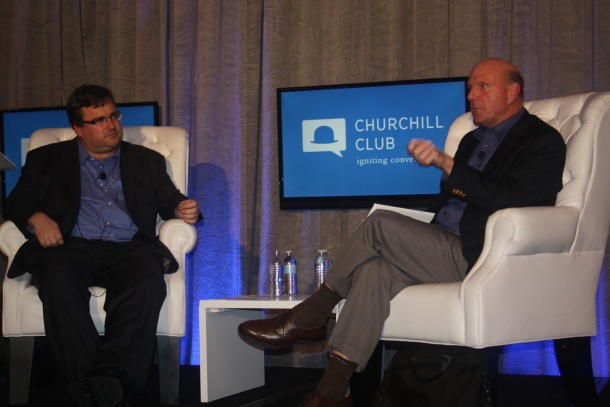Ballmer Praises Sinofsky While Criticising Apple and Android [VIDEO]

In his first interview since the high-profile departure of Steven Sinofsky from Microsoft, CEO Steve Ballmer praised his former colleague, ruled out a Surface phone and took a swipe at Apple and Android.
Ballmer: Microsoft Sees Opportunity in Hardware from Churchill Club on FORA.tv
"Sinofsky has made one of the most amazing contributions anyone has ever made to any company. I wish him well." Ballmer told LinkedIn founder Reid Hoffman at the Churchill Club in Silicon Valley last night.
As well as briefly talking about Sinofsky, Ballmer reflected on what has been an incredibly busy time for the Redmond-based company.
In the last couple of months, Microsoft has launched the latest version of its PC operating system, Windows 8; launched the latest version of its mobile phone OS, Windows Phone 8 and even manage to find time to launch Surface, Microsoft's own tablet PC.
Surface
Speaking about Surface, Ballmer said it offers users the best of a tablet and the best of a traditional PC:
"This notion of the best of worlds is not the craziest notion - if you really can give people the best of work and play. [There is the] option to lie back, lean forward or lean all the way forward."
When Microsoft announced Surface at a hastily-convened press conference back in June, there were murmurings of discontent from Microsoft's hardware partners such as Asus, Samsung, HP, Acer and Lenovo.
However, Ballmer said last night that there was a lot of room for these manufacturers to stand out and that these OEMs will build the "lion's share of Windows devices."
The Microsoft CEO did add however that there will be opportunities for Microsoft to fill in the gaps it sees appearing in the space between hardware and software:
"There has been a shift. OEMs will still build lion's share of Windows devices. With that said, it is clear that there is an innovation opportunity on the seam between hardware and software - and it must not go unexploited by Microsoft.
"We continue to work with HP and Dell, Toshiba and Sony and Acer and Asus and HTC and Nokia and Lenovo. But where there is innovation that crosses hardware/software boundary, they are not going to cede."
Seam
One such "seam" could be a potential 7in Xbox Surface gaming tablet which has been rumoured since the June launch of the Windows 8 tablets.
Hoffman brought up the possibility of a Microsoft built PC, but Ballmer said that Surface was a PC "for all intents and purposes." Ballmer then went on to broach the subject of a Surface phone, powered by Windows Phone 8:
"Same is true in phones. No need to repeat what other companies are doing brilliantly."
Ballmer may believe that manufacturers like Nokia, HTC and Samsung are doing brilliantly but that is not reflected in smartphone sales, with the Windows Phone platform gaining less than 1 percetn in the last 12 months according to the latest figures from Gartner.
Windows Phone currently holds just 2.4 percent of the global mobile phone market, placing it below Android, iOS, BlackBerry, Bada and Symbian.
Ballmer said there is an "unmet need from operators" for a third competitive ecosystem and from the consumer perspective; this is "a lot of room to innovate."
He added that the challenge is to get 10 percent of the smartphone market, and then 15 percent, and then 20 percent. "[We are] not trying to get to 60 percent overnight."
Apple and Android
Ballmer was then asked about Microsoft's Windows Phone strategy and he opened by saying complementing its main rivals: "Both of the other guys [Apple and Google] have done a great job."
He then went on to point out issues with both platforms.
Turning his attention to Android first, Ballmer didn't hold back in pointing out some problems with Google's platform:
"The ecosystem of Android is a little bit wild from malware and app compatibility perspective, uncontrolled."
This is not an unknown issue with Android, with Finnish security company, F-Secure, last week announcing it had recorded a ten-fold increase in malware detection in the last three months on the Android platform.
Fragmentation is also a well-known issue with Android, with the same software running on a huge array of devices featuring screens ranging from 3in in size up to 11in.
Turning to Apple, Ballmer highlighted that iPhone and iPads were expensive, as well as mentioning the walled-garden issue many have with Apple's ecosystem.
"Apple's ecosystem is both highly-controlled and quite high priced. In Russia it is $1,000 for an iPhone."
Ballmer went on to say that operators around the globe are looking for a third vendor to join Apple and Samsung in the high-end sector of the market. Speaking about consumers, Ballmer said:
"We have a customer set that wants an alternative; a differentiated point of view. And then the products have to be great. When you whip out your phone, you want to see the things that matter to you.
"Also, the hardware won't stay the same; we are not at the end of the innovation phase in mobile phone hardware."
© Copyright IBTimes 2025. All rights reserved.






















